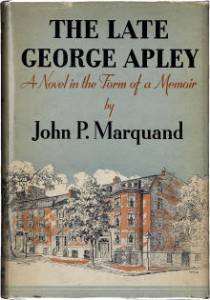 To Laetitia Bolton
To Laetitia Bolton
C/o Brown Shipley & Co
123, Pall Mall, London, S.W.1
Rome. December 14, 1936
Dear Miss Bolton,
The Late George Apley, at once excited my interest, as certain parts, beginning with the sub-title, suggested that it might be a parallel or corrective of to my Last Puritan. At first the hypocritical style puzzled me a little: Was the real author laughing at the fictitious author, a prim biographer discreetly leaving out everything interesting,or was he that prim biographer himself? I see now, on finishing the book, that the intention is tenderly satirical. Life consists of learning how to be unhappy without worrying too much about it. I don’t believe he ever liked half of what he did, but simply everlastingly carried on, like the British Army. Everything people like seems to be a substitute for what they really would have liked; and they talk, or rather write (since the book is composed chiefly of letters) as if they were speaking or writing an acquired foreign language. In comparing this picture with my memory of Boston society, it seems to me not so much exaggerated as too external, too verbal. Nice Boston people often talked like this, but they had more sense and more heart: they knew and understood everything, while keeping themselves personally under conventional restraints. Mr. Marquand’s hero seems to me not so much Bostonian as provincial. However, the book is a document, and I am much obliged to you for having sent it to me.
Yours sincerely,
G Santayana
From The Letters of George Santayana: Book Five, 1933-1936. Cambridge, MA: The MIT Press, 2003.
Location of manuscript: The Houghton Library, Harvard University, Cambridge MA
